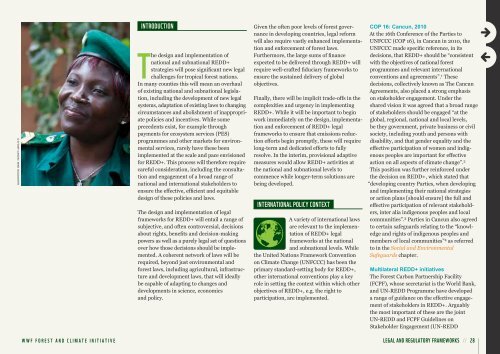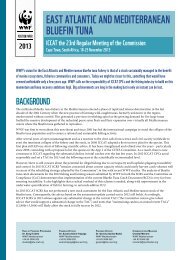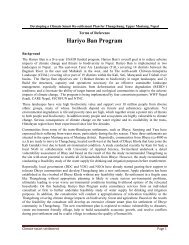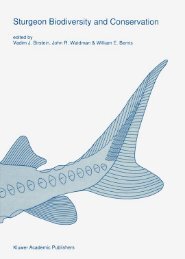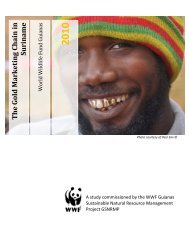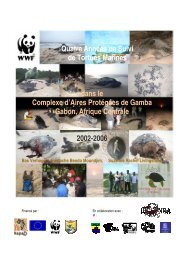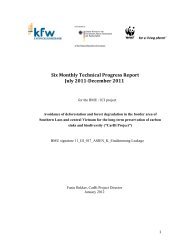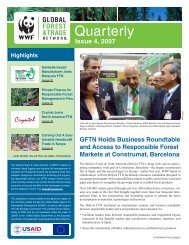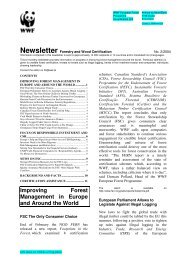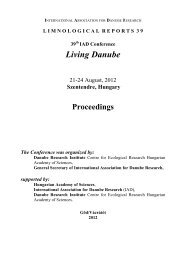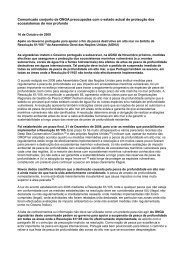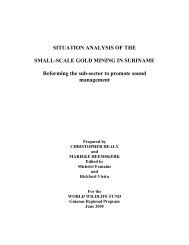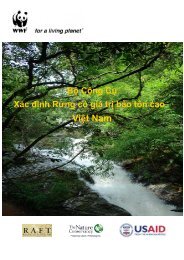WWF Guide to Building REDD+ Strategies
WWF Guide to Building REDD+ Strategies
WWF Guide to Building REDD+ Strategies
Create successful ePaper yourself
Turn your PDF publications into a flip-book with our unique Google optimized e-Paper software.
© © <strong>WWF</strong>-CANON / MIKE GOLDWATER<br />
intRoduCtion<br />
the design and implementation of<br />
national and subnational <strong>REDD+</strong><br />
strategies will pose significant new legal<br />
challenges for tropical forest nations.<br />
In many counties this will mean an overhaul<br />
of existing national and subnational legislation,<br />
including the development of new legal<br />
systems, adaptation of existing laws <strong>to</strong> changing<br />
circumstances and abolishment of inappropriate<br />
policies and incentives. While some<br />
precedents exist, for example through<br />
payments for ecosystem services (PES)<br />
programmes and other markets for environmental<br />
services, rarely have these been<br />
implemented at the scale and pace envisioned<br />
for <strong>REDD+</strong>. This process will therefore require<br />
careful consideration, including the consultation<br />
and engagement of a broad range of<br />
national and international stakeholders <strong>to</strong><br />
ensure the effective, efficient and equitable<br />
design of these policies and laws.<br />
The design and implementation of legal<br />
frameworks for <strong>REDD+</strong> will entail a range of<br />
subjective, and often controversial, decisions<br />
about rights, benefits and decision-making<br />
powers as well as a purely legal set of questions<br />
over how those decisions should be implemented.<br />
A coherent network of laws will be<br />
required, beyond just environmental and<br />
forest laws, including agricultural, infrastructure<br />
and development laws, that will ideally<br />
be capable of adapting <strong>to</strong> changes and<br />
developments in science, economics<br />
and policy.<br />
Given the often poor levels of forest governance<br />
in developing countries, legal reform<br />
will also require vastly enhanced implementation<br />
and enforcement of forest laws.<br />
Furthermore, the large sums of finance<br />
expected <strong>to</strong> be delivered through <strong>REDD+</strong> will<br />
require well-crafted fiduciary frameworks <strong>to</strong><br />
ensure the sustained delivery of global<br />
objectives.<br />
Finally, there will be implicit trade-offs in the<br />
complexities and urgency in implementing<br />
<strong>REDD+</strong>. While it will be important <strong>to</strong> begin<br />
work immediately on the design, implementation<br />
and enforcement of <strong>REDD+</strong> legal<br />
frameworks <strong>to</strong> ensure that emissions reduction<br />
efforts begin promptly, these will require<br />
long-term and dedicated efforts <strong>to</strong> fully<br />
resolve. In the interim, provisional adaptive<br />
measures would allow <strong>REDD+</strong> activities at<br />
the national and subnational levels <strong>to</strong><br />
commence while longer-term solutions are<br />
being developed.<br />
inteRnational PoliCy Context<br />
A variety of international laws<br />
are relevant <strong>to</strong> the implementation<br />
of <strong>REDD+</strong> legal<br />
frameworks at the national<br />
and subnational levels. While<br />
the United Nations Framework Convention<br />
on Climate Change (UNFCCC) has been the<br />
primary standard-setting body for <strong>REDD+</strong>,<br />
other international conventions play a key<br />
role in setting the context within which other<br />
objectives of <strong>REDD+</strong>, e.g. the right <strong>to</strong><br />
participation, are implemented.<br />
COP 16: Cancun, 2010<br />
At the 16th Conference of the Parties <strong>to</strong><br />
UNFCCC (COP 16), in Cancun in 2010, the<br />
UNFCCC made specific reference, in its<br />
decisions, that <strong>REDD+</strong> should be “consistent<br />
with the objectives of national forest<br />
programmes and relevant international<br />
conventions and agreements”. 1 These<br />
decisions, collectively known as The Cancun<br />
Agreements, also placed a strong emphasis<br />
on stakeholder engagement. Under the<br />
shared vision it was agreed that a broad range<br />
of stakeholders should be engaged “at the<br />
global, regional, national and local levels,<br />
be they government, private business or civil<br />
society, including youth and persons with<br />
disability, and that gender equality and the<br />
effective participation of women and indigenous<br />
peoples are important for effective<br />
action on all aspects of climate change”. 2<br />
This position was further reinforced under<br />
the decision on <strong>REDD+</strong>, which stated that<br />
“developing country Parties, when developing<br />
and implementing their national strategies<br />
or action plans [should ensure] the full and<br />
effective participation of relevant stakeholders,<br />
inter alia indigenous peoples and local<br />
communities”. 3 Parties in Cancun also agreed<br />
<strong>to</strong> certain safeguards relating <strong>to</strong> the “knowledge<br />
and rights of indigenous peoples and<br />
members of local communities” 4 as referred<br />
<strong>to</strong> in the Social and Environmental<br />
Safeguards chapter.<br />
Multilateral <strong>REDD+</strong> initiatives<br />
The Forest Carbon Partnership Facility<br />
(FCPF), whose secretariat is the World Bank,<br />
and UN-REDD Programme have developed<br />
a range of guidance on the effective engagement<br />
of stakeholders in <strong>REDD+</strong>. Arguably<br />
the most important of these are the joint<br />
UN-REDD and FCPF <strong>Guide</strong>lines on<br />
Stakeholder Engagement (UN-REDD<br />
<strong>WWF</strong> FOREST AND CLIMATE INITIATIVE leGal and ReGula<strong>to</strong>Ry FRameWoRkS // 28


